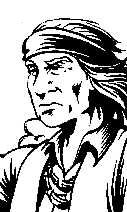 An e-mail exchange continues the diatribe begun in Dennis Prager and The Ecological Indian.
An e-mail exchange continues the diatribe begun in Dennis Prager and The Ecological Indian. An e-mail exchange continues the diatribe begun in Dennis Prager and The Ecological Indian.
An e-mail exchange continues the diatribe begun in Dennis Prager and The Ecological Indian.
>> I think the overall point is that, given the opportunity and means, the Indians would have been just as destructive as the European Americans <<
Perhaps, but that's not the same as saying they were as destructive as the Europeans.
I sent the following message recently:
Interesting article in the LA Times on the excavation of Cahokia. It notes that Cahokia was the largest population center in North America until after the Revolutionary War. It also notes that the inhabitants built a log wall around the domain, using 20,000 trees, three times. That helped denude the nearby forests.
From that I conclude that pre-Columbian Natives were just as "civilized" as anyone else. For better or worse.
The message here, and in all my multicultural postings, is that every culture has something to offer us. What I dispute is the incessant exaltation of Western civilization above all others. Western civilization exists only because it borrowed from earlier, non-Western traditions. (See my posting, Multicultural Origins of Civilization, for more on that point.)
The corollary to my message is that every culture has problems. I'm not exalting a Native American culture or lifestyle over its Western equivalent. You don't see me living in a tipi, hunting Bambi and kin, or grubbing for roots in the dirt, do you? Clearly I enjoy the benefits of our so-called civilization; I don't deny them.
I'll grant that Indians might have been no better than "average" in terms of their stewardship of nature. But Euro-Americans have been far worse than average. Despite their much larger populations, are China and India paved over like parking lots? No. The idea of conquering nature and replacing it with something "better" (cities, farms, strip malls, McDonald's) is peculiarly Western.
>> (and recent archaeology suggests that a lot of the "Indians" were in fact descended from Europeans, 10-20K years ago) <<
If you're referring to the Kennewick Man conflict, this is a gross misstatement of current thinking. A recent article declared he was firmly Native American despite his alleged resemblance to Captain Picard. The immigration pattern may have been more complex than the experts previously thought, with successive waves from northern Asia and perhaps southern Asia and even Polynesia. But Europe? I don't think anyone is seriously claiming a European origin for Indians.
>> If you believe in racial equality, you have to believe each race has the same vices, or at least the same capacity for those vices. <<
See above on Cahokia. Or the climax of PEACE PARTY #2, where a divergence of opinion is evident. Although Billy is one of the heroes, he's ready to shoot to kill. And in the unpublished #3, a Navajo doesn't hesitate to use deadly force against an escaped llama.
For that matter, see #1, which opens with Billy and Oliver in pitched argument. And when they see a possible snake in the road, Oliver wants to run it over. So the diversity of "Indian thought," and my understanding of same, should be clear even in these few pages.
Rob actually reads The Ecological Indian...and has more to say.
Related links
Billy and Drew talk about ecological Indians
The "inexcusable" Hopi smothering of eaglets
More on the alleged superiority of Western civilization over indigenous cultures
|
. . . |

|
All material © copyright its original owners, except where noted.
Original text and pictures © copyright 2007 by Robert Schmidt.
Copyrighted material is posted under the Fair Use provision of the Copyright Act,
which allows copying for nonprofit educational uses including criticism and commentary.
Comments sent to the publisher become the property of Blue Corn Comics
and may be used in other postings without permission.